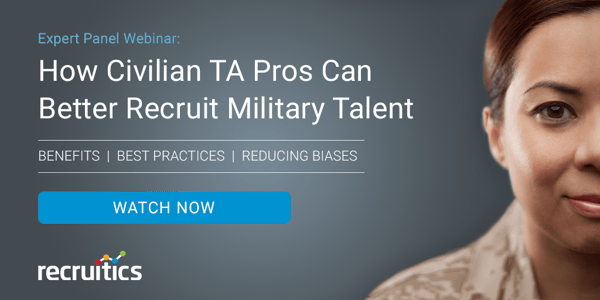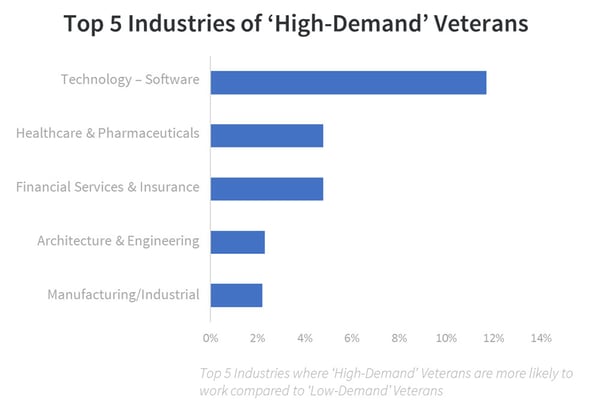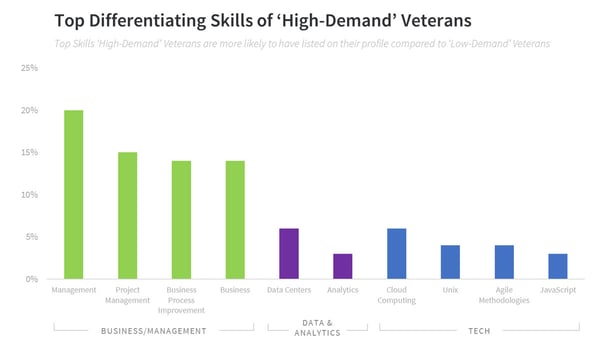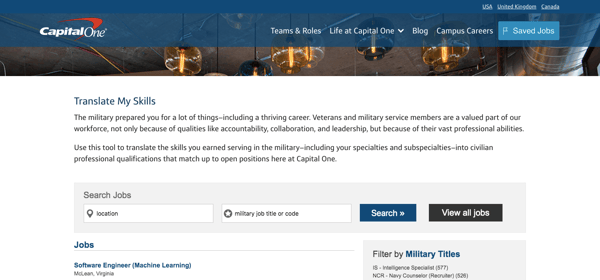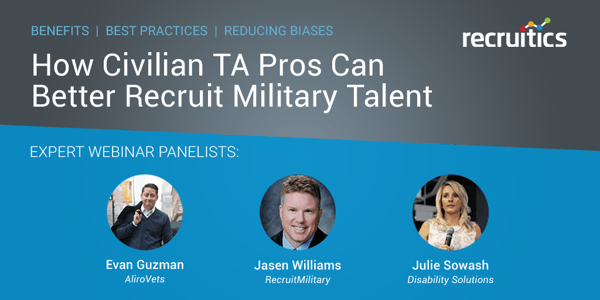4 Purpose-Driven Recruitment Strategies for Effectively Hiring Veterans & Military Talent
Disciplined, educated, grace under pressure — these characteristics are a huge asset to employers and always in high demand in the job market. They also exist within over 19 million veteran candidates, 200,000 of which are transitioning from military to civilian life every year and actively searching for new jobs.
Veterans make up 8% of the U.S. civilian population, with 19.2 million men and women who have transitioned out of the military and either are searching for or are already employed in civilian careers. Read on to learn all about the challenges of recruiting military talent and how to overcome them with a solid veteran recruitment marketing strategy to attract top talent.
Quick Stats on Veteran Employment
Great strides have been taken to reduce veteran unemployment. The latest veteran unemployment rate from September 2019 was 3.2%, the lowest it has been since 2000 as well as “the 13th consecutive month when the veteran unemployment rate was lower than the non-veteran unemployment rate,” says the U.S. Department of Labor.
There are currently more than 7.1 million job openings for veterans, and the veteran homelessness rate has decreased by 5.4% from 2017 to 2018. However, of the 19.2 million men and women who are veterans according to the Bureau of Labor Statistics, 326,000 of them are still unemployed. There is still work to be done, and this is your guide on how to recruit veterans and build your military recruitment marketing strategy.
Why You Should Recruit Veterans
Every employer and recruiter should take a step back and evaluate why they wish to recruit veterans. Make sure that it’s for the right reasons and with a clear goal in mind. Sean Kelley, the Talent Acquisition Director at Amazon and a Navy veteran, says he makes it his mission to recruit veterans to “change lives. I do it to feel joy, I do it to make a difference, I do it to have an impact—and the point at which I feel most alive is when I do this on behalf of military veterans.”
Veterans are an incredible resource of talent with a wide range of skills that are in high demand in the workforce. They are dedicated, disciplined, educated, work well under pressure, have a strong work ethic, global perspectives, leadership, problem-solving, and decision-making skills that make them ideal candidates.
A 2018 Veteran Hiring Survey by Orion Talent discovered:
-
- 65% of respondents said their offer acceptance rates are higher for veterans compared to civilians
- Technical know-how and self-determination are the stand-out skills employers notice in veterans
- 68% of respondents said veteran retention rates are higher than civilians
LinkedIn’s study revealed that the top 5 industries where high-demand veterans are more likely to work are Technology, Healthcare & Pharmaceuticals, Financial Services & Insurance, Architecture & Engineering, and Manufacturing—fields teaming with success and in need of top talent.
The study also examined which skills high-demand veterans have that employers want. Business and management skills surprisingly tower over technology and data as the most sought after. LinkedIn states, “we learned that veterans are 5-6x more likely to list certain technical skills than nonveterans, and 2-3x as likely as nonveterans to list certain soft skills that make them great team members and leaders.”
Featured Resource:
- 5 Reasons You Should Hire Veterans
- Learn more about Why Employers Should Hire Veterans below:
Challenges in Recruiting Veterans
A collaborative study between VetAdvisor and the Institute for Veterans and Military Families at Syracuse University (IVMF) revealed the biggest obstacles veterans face in their post-military employment. The top three are:
-
- 68.24% - finding opportunities that match their military experiences
- 58.51% - lack of employment opportunities in their area
- 53.65% - finding employment opportunities that match their education
A large portion of the difficulty veterans have in finding opportunities that match their education and military experience lies with translation. Military Occupational Codes (MOCs) are very different from the typical titles of “Sales Manager” or “Product Developer” that the civilian career force grew up on. Veterans and recruiters both have to work to translate military life to a civilian career. Michael Hansen, the National Director of Military Affairs at Power Home Remodeling says, “After the shock factor of not being in the military anymore subsides, it’s all about how quickly you can apply the skills that you developed in the military. That application phase is the biggest differentiator of success.”
Healthcare also made the list with 9% of veterans needing mental health care and 12% needing physical health care. While proper physical and mental health care is an issue facing many veterans, as we can see by these numbers, not all veterans have these difficulties. One of the many challenges with recruiting veterans is the stigma associated with mental health issues and the stereotype that all veterans have some, which leads to some managers being hesitant to hire them or completely overlooking veterans who do have disabilities.
According to the U.S. Department of Labor, “Veterans with a service-connected disability had an unemployment rate of 5.2 percent in August 2018, higher than the rate for veterans with no disability (3.5 percent).”

Also, a Veterans Well-Being Survey by Edelman Intelligence found that only 53% of employers believe that “compared to non-veterans, most veterans do not have successful careers after leaving the military.” These numbers show a perception toward veterans that employers need to work on shifting or else they could be missing out on great talent and hard-working employees.
The VetAdvisor and IVMF research also evaluated the reasons why veterans left their first post-military jobs. Work environment and culture came in at 20.25%. Andrew Allen, an Army veteran, remembers one of his first interviews after transitioning into civilian life. An interviewer asked him, “So how are you going to adjust to not being told what to do every second of the day?” Due to this interaction (and many more like it), Andrew considered not accepting the job offer since he felt the interviewer knew nothing about military culture. Orion Talent’s 2018 Veteran Hiring Survey revealed that 62% of businesses that recruit veterans give “essential recruiting work to resources who are not trained or experienced in veteran recruitment.” Employers must work to increase awareness of military culture and decrease biases and misconceptions about veterans, the military, and mental health.
Featured Resource:
Effectively Recruit Veterans with These 4 Strategies
How can employers overcome the challenges of recruiting veterans, reduce barriers to entry, and attract top military talent? Let’s dive into it with these military recruitment marketing strategies.
1. Showcase Your Military-Friendly Employer Brand Clearly & Authentically
As an employer, you can offer a variety of benefits and resources that showcase your military-friendly culture and commitment to veteran hiring. Here are a few great examples:
Benefits for Military Hires: Power Home Remodeling offers a $3,000 signing bonus for veterans and military spouses. The U.S. Department of Veteran Affairs has a wide range of benefits for veterans, from tuition assistance and loan repayment to specialized tools to help with the transition.
Veteran Employee Resources: Walgreens offers on the job training, retail management training, and resource groups to veterans. Boeing has 30 veteran-focused engagement teams that offer “skill development and workforce transition training, supporting recovery and rehabilitation programs that focus on post-traumatic stress.”
Present your company’s culture within a specific careers site page for military and veteran candidates, or even by building a full microsite for your military and veteran hiring initiatives, and include resources such as:
-
-
- Key messages that resonate with veterans
- Military-specific collateral and landing pages
- Videos that highlight current veteran employees
- Social media campaigns geared toward veterans
- Military-specific benefits and resources
-
Edelman Intelligence’s Veterans Well-Being Survey revealed that “veterans who have been in their current job for more than two years cite good benefits, a competitive salary, and excellent management as their key reasons for staying.” Consider offering military specific benefits and resources and highlight them on your veteran careers page.
Identify your employer value proposition (EVP) that speaks to veterans. Saying that you’ve been in business for so many years is not going to pack the same punch to veterans as it may to the general population. Veterans want to know who you serve, what your values are, and what defines success in your organization.
Be clear on your company’s mission and purpose to attract veterans to your company, and activate that employer brand EVP throughout your careers content. Here are some examples of how:
Customized Career Pages & Microsites: Amazon and Microsoft have excellent examples of microsites dedicated to resources, success stories, military partners, their pledge, and opportunities. CVS Health has a great military-focused careers site page that appeals to veterans through their customized copy and values, military-friendly awards, and veteran spotlight video.
Graphics & Design: Capital One displays their array of military-friendly badges next to their veteran benefits and commitment, so it is immediately clear they are known and respected in the military community.
Copy & Messaging: Marriott International Inc.’s veteran career page uses key messaging to appeal to military candidates and entice them to apply.
Blogs: Booz Allen Hamilton has a variety of blogs dedicated to challenges veterans face. This inbound marketing technique helps build relationships with veteran job seekers and establishes them as an expert on helping military talent transition into the workforce. UnitedHealth Group also showcases great articles and resources for veterans on their site.
Social Media: Power Home Remodeling infuses messaging that targets veterans in their social posts.
Purpose. Growth. Camaraderie. They don’t have to be distant memories. You deserve a career that offers all three and values you for your impactful skills. Watch the full video to see how we are defining our destiny and how you can do the same - https://t.co/59Hc9Umzfg pic.twitter.com/OSDHxuk38F
— Power Home Remodeling (@PowerHRG) October 16, 2019
Featured Resource:
- Military-Friendly Employer Brands We Admire and Why
2. Translate Military Jargon into Civilian Skills
A military skills translator is a great resource when crafting job advertisements and descriptions. There are several options out there—Google, YourJobPath.com, Military.com, and more.
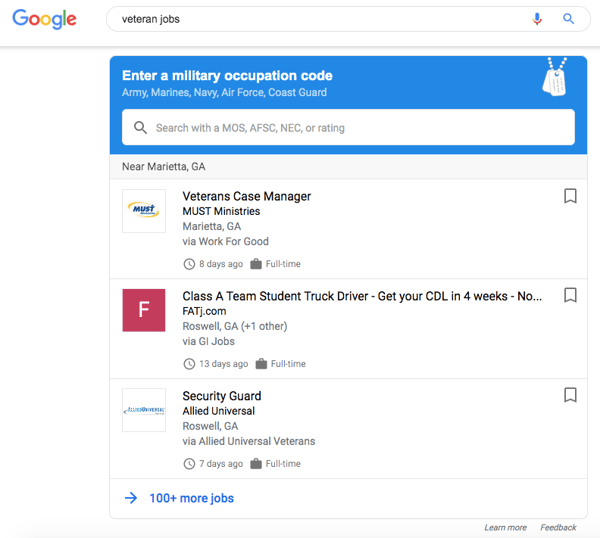
Make it even easier for veteran job seekers by building your own military skills translator into your careers site page or job search functionality. Kelley Powers, Recruitics' VP of Marketing Strategy, says, "Employers should consider implementing MOC translators on their careers site to make the military candidate experience easier and more streamlined, aligning their skills from service with skills in civilian jobs." She adds, “The talent pool of military candidates is a powerful and dedicated workforce returning home and who have so much to offer.”
Employers with Military Skills Translator: Companies like Southwest, Kaiser Permanente, and Capital One have their version of military skills translators on employment pages to directly communicate with veteran candidates.
Translation is key, even in person. Make sure to use language that is easily deciphered by veterans. In interviews, ask open-ended questions so candidates have an opportunity to describe their experience instead of being disqualified for a ‘no’ answer for an acronym or skill set that may be foreign to them. Even better, have a currently employed veteran prep your candidate for the interview on what to expect, how to translate military skills into civilian ones, company culture, and day-to-day work. Best yet, have dedicated recruiters and sourcing team members that are veterans work on your military talent acquisition strategies.
3. Develop a Multi-Media Military Recruiting Strategy Utilizing Both Online and Offline Channels
The right media mix of both online and offline channels allows employers to reach and engage active and passive military candidates.
Use an offline media strategy to attract veterans, such as attending job fairs on military bases, to expand your visibility. Not only can these fairs increase your applicants, but they can also solidify your company’s reputation as a military-friendly employer. Make sure you send the right representatives. Sending a currently employed veteran, a recruiter that’s also a veteran, or someone knowledgeable about military culture and the challenges many veterans face could be the difference between a successful job fair and returning empty-handed.
Dive into veteran-specific candidate sourcing and engagement techniques. Along with searching through resume databases for candidates with military experience, you can also reach out to the military community. Veterans are a tight-knit community who often want to help their peers. Tap into your existing resources by reaching out to veterans you currently employ to see if they know anyone searching for a job. Contact veteran employment representatives at your state’s offices or people who work at organizations that support veterans, such as Iraq and Afghanistan Veterans of America. They can help get your employment message out to their members and contacts via word of mouth, email, or even their social platforms to connect you with hundreds or thousands of veterans.
WATCH OUR VETERAN RECRUITING PANEL WEBINAR:
"How Civilian TA Pros Can Better Recruit Military Talent"
Like any talent search, there’s no single place to find exactly the skill set you’re looking for, and we recommend understanding the data behind your recruitment marketing strategy to identify the best media mix. Ivan Vega, Recruitics' Sr. Programmatic Media Analyst and a veteran, says, "Employment resources are aplenty for the modern veteran. Veterans today are well-informed and typically have a good idea about where to start their job search."
With that said, here are some niche websites—government and private—that specialize in veteran and military recruiting to consider incorporating into your strategy:
Recruitics analyzed job traffic sources relating to military and veterans (proprietary data) for January through September 2019, and a few of the above recruitment media sources stood out based on total job views and application volume. If you'd like to get that list, feel free to reach out to us.
Featured Resources:
- Veteran Recruitment: A Multi-Pronged Journey
- Recruitment PPC Advertising: Military & Veterans
- Why the Right Media Mix is Critical to Recruitment Marketing Success
- Understanding Key Recruitment Marketing Metrics & KPIs
4. Make a Commitment to Veteran Hiring & Highlight When You Get Recognized
Examining other companies’ veteran campaigns helps with perspective, inspiration, and motivation. You should look at their:
-
-
- Commitment to Hiring Veterans
- Recognition in Awards, Rankings & Ratings
-
Let’s break each of these down with examples that can help you improve your veteran recruitment marketing.
Commitment to Hiring Veterans
-
-
- The 100,000 jobs mission is an initiative that started in 2011 and inspires us all. Companies such as Delta Airlines, Verizon, Comcast, and more have collectively hired 547,109 veterans and active duty employees and are still working toward their pledge.
-
-
-
-
The Home Depot has a strong commitment to hiring veterans. Glassdoor states they have employed “55,000 veteran employees since 2012.”
-
-
-
-
- Amazon pledged in 2016 to hire “25,000 veterans and military spouses in five years while training 10,000 more in cloud computing,” LinkedIn states.
-
Recognition in Awards, Rankings & Ratings
Employers can showcase their commitment to hiring veterans by applying for awards, and hopefully, winning and getting rated or ranked. Awards are a great way to display your commitment to veterans. Look for opportunities to be recognized—there are so many out there! Here are a few of our favorites:
-
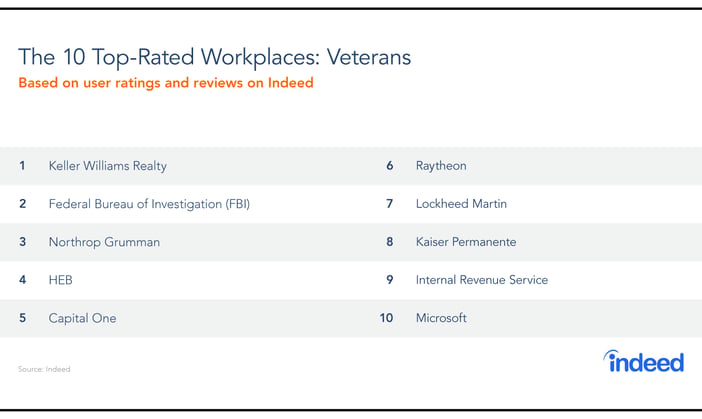
- The Department of Labor awards companies each year that “hire veterans and take an effort to establish employee development programs and veteran-specific benefits to improve their retention.” See 2018’s recipients here. The 2019 application period has closed with winners being announced later this fall, but the 2020 awards are open to submissions. Check out the criteria here.
- Military Friendly assesses employers and awards them every year with a Military Friendly badge they can display on places like their website, social sites, or even flyers and brochures. They also have an award for Military Spouse Friendly Employers, which is another great component for employers to consider. Read 2020’s list here, and learn how you can qualify.
- MilitaryTimes has a best for vets ranking. Check out the 2019 winners.
- ESRG (Employment Support of the Guard and Reserve) offers a variety of awards, including Extraordinary Employer Support Award, Seven Seals Award, Pro Patria Award, and the Above and Beyond Award. Employees can nominate their employers here.
Featured Resource:
Veterans are a talent source you don’t want to miss out on. By showcasing your military-friendly employer brand, creating a military-targeted recruitment media strategy, translating military jargon, and making a commitment to hiring veterans, you will attract more skilled veteran candidates and great talent. We all need to work on reducing not just the veteran unemployment rate, but also biases and misconceptions about military culture that create barriers to entering the civilian workforce. Are you ready? Let’s get to work.
Have any other tips on veteran recruitment marketing strategies? Share them with us on Twitter or contact us.
Other Great Resources:
- Veteran Hiring Guide: How to Recruit and Retain America's Best (MONSTER)
- Veterans Day 2019: From the Armed Force to the Labor Force (INDEED)
- Veterans Entering the Civilian Jobs Market Can Face Hurdles (HR EXECUTIVE)
- Phenom Military Code Search: An Easier Way for Veterans to Find the Right Job (PHENOM PEOPLE)
